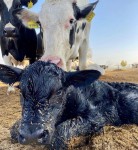Beef x Dairy Workshop - Postponed to Winter time!
Event Details
Date
April 27, 2022
November 23, 2022
Host
Southwest New York Dairy, Livestock and Field Crops ProgramCamila Lage
607-422-6788
email Camila Lage

Given the challenging conditions within the dairy industry today, dairy farmers are seeking solutions to enhance their bottom lines. Replacement animals typically account for 15 to 20 percent of milk production costs, but advancements in reproductive management on many farms resulted on an oversupply of dairy replacement heifers relative to anticipated herd needs, which has contributed to economic strain for many dairies. Male dairy calves, and about one third of dairy heifers, are sold as calves at a steep discount compared to traditional beef calves because of lower efficiency and yield. In today's market, dairy calves may sell for $0-$80 while crossbred calves can sell for $100-$330. For dairies of all sizes, selectively breeding some dairy cattle to beef bulls via artificial insemination represents a potential increase in gross profits. Small, relatively inexpensive changes in management can have the potential to make large impacts for the dairy farmer, the beef market, and for local communities.
An increase of quality crossbred calves in the marketplace can benefit beef farmers because they grow more similarly to pure beef animals, and more efficiently than pure dairy calves. Making sure crossbred calves are treated optimally from birth provides higher quality young stock for farms that raise and finish beef. Crossbred cattle tend to grade better than pure dairy animals, resulting in high quality cuts for the consumer market while requiring less feed to get to marketable size than pure dairy animals. This reduces input costs as well as the environmental impact per pound of beef produced. Through the use of this technology, profits for both dairy and beef producers can increase, and more beef can be made available to communities in our region.
Our objective is to enhance the knowledge of beef and dairy producers to help 1) Dairy farmers proactively manage their cow and heifer inventories to increase the genetic potential of replacement heifers and the income from calves not used for herd replacement, 2) Beef farmers learn what makes a good crossbred calf and that there is potential for crossbred animals in the beef herd, and 3) Connect dairy and beef farmers so they can work together to produce a healthy and efficient calf that will create value for the whole beef supply chain.
Program Topics
- Economics of Adopting Beef x Dairy on your Herd
- Make the Most out of Beef x Dairy in your Herd
- Setting up your Calves for Success
- Assuring the Market Value of Crossbred Calves
- Marketing your Finished Beef x Dairy Animals
- Roundtable Discussion
When: Postponed until winter time!
Upcoming Events
Boots in the Barn: Cornell Dairy Research Updates
January 13, 2026
January 20, 2026
January 27, 2026
February 3, 2026
February 10, 2026
February 17, 2026
February 24, 2026
Join us for some or all!
Deerworm and Flukes in Small Ruminants Webinar
February 25, 2026 : Deerworm and Flukes in Small Ruminants Webinar
Dr. Mary Smith from Cornell's College of Veterinary Medicine and Dr. Rachel White from UMaine Cooperative Extension will be discussing the lifecycles, signs, prevention, and management of deerworm and liver flukes in small ruminants.
NYSDEC How to Get Certified Course
March 3, 2026 : NYSDEC How to Get Certified Course
Ellicottville, NY
NYSDEC training course in preparation to take the pesticide applicator exam.
Announcements
Cows, Crops & Critters Newsletter Sponsorship
TRYING TO REACH GROWERS AND AGRIBUSINESSES IN OUR SOUTHWEST REGION OF NEW YORK?Weekly Email Update: Shared with 625+ households who have signed up with our program.
Monthly Paper Mailer: To reach our stakeholders and farmers who lack internet access, we send out a monthly mailer where your company's logo and contact information would be featured with a mailing list of 330+ households.
If you sponsor our weekly and monthly publications you reach approximately 955 households.






